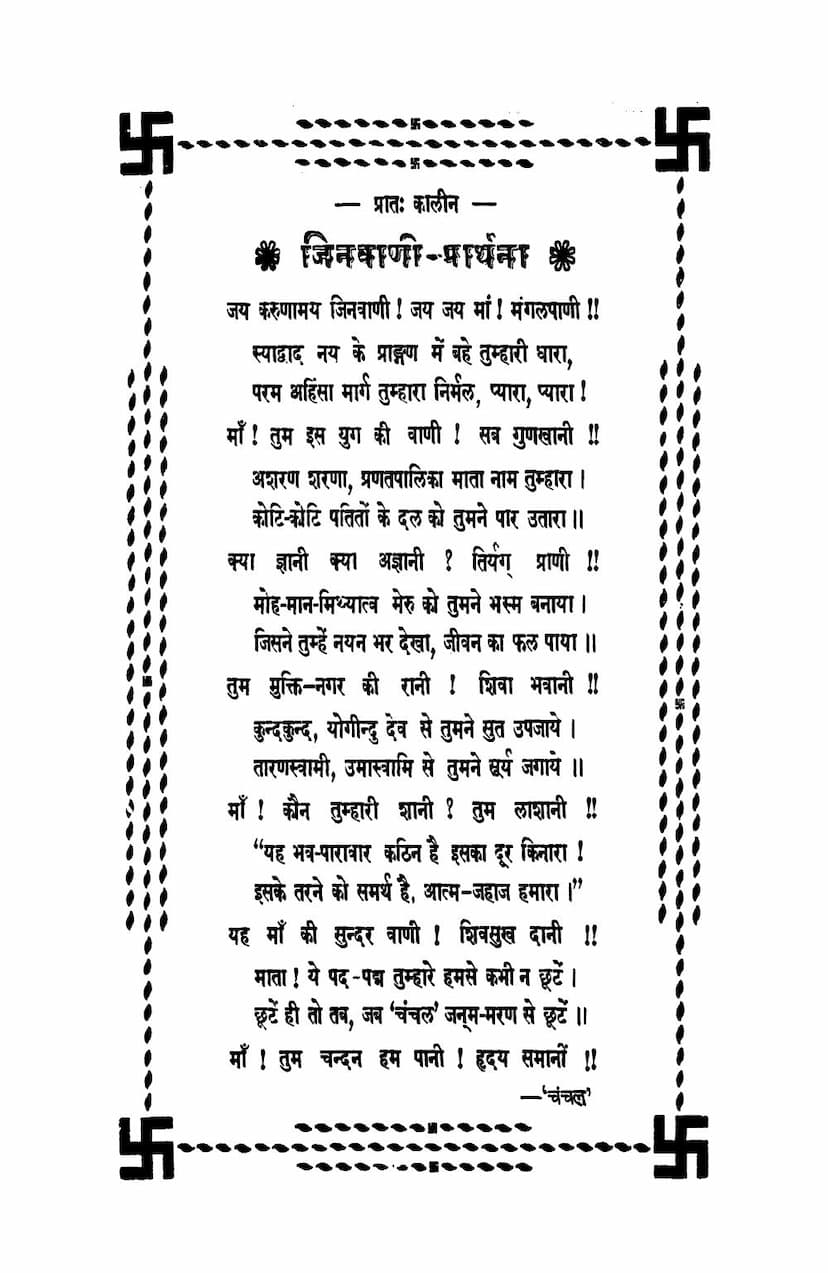Taranvani Samyakvichar Part 2
Added to library: September 2, 2025

Summary
Taranvani Samyakvichar Part 2: A Comprehensive Summary
Book Title: Taranvani Samyakvichar Part 2 Author: Taranswami Publisher: Taranswami Catalog Link: https://jainqq.org/explore/009703/1
This text, "Taranvani Samyakvichar Part 2," authored by Taranswami, is a profound exploration of Jain philosophy, primarily focusing on the internal, spiritual path to liberation. The work emphasizes self-reliance (स्वावलंबिता) as the core principle of Jainism, contrasting it with dependency on external forces or beings.
Core Principles and Themes:
-
Self-Reliance and the Inner Self: The central tenet is that liberation (Moksha) is attained not through the intervention of external deities or rituals, but through the worship and development of one's own soul (आत्मा) and its inherent virtues. Taranswami advocates for the worship of the self (आत्मा की पूजा), considering the soul as both the worshipper (आराधक) and the worshipped deity (आराध्य देव). The soul is the source of knowledge, the knower, and the known; it encompasses knowledge, perception, and conduct.
-
The "Atma Mantra": Taranswami's teachings revolve around the "Atma Mantra" (आत्म मन्त्र), which is equivalent to the "Ram Mantra" in its transformative power. This mantra, when deeply ingrained in the heart, elevates an individual to spiritual greatness and leads them to the ultimate abode of liberation.
-
Critique of External Worship and Rituals: The text strongly discourages reliance on external forms of worship, such as idol worship or rituals performed with the expectation of divine intervention. It asserts that these practices, including external displays of devotion to deities or even the veneration of the physical presence of Tirthankaras, do not lead to true spiritual welfare. The true path lies in cultivating the divine qualities within the self.
-
The True Meaning of "Deva" and "Guru": The book clarifies that "Deva" (Divine) is not an external entity but the soul itself (आत्मा), which is inherently pure, conscious, and blissful. Similarly, the true "Guru" is the inner conscience (अन्तरात्मा) that guides one towards the path of liberation. The teachings of Tirthankaras are valuable as pointers, but the actual realization comes from within.
-
Reinterpreting Religious Concepts: Taranswami reinterprets various religious concepts from a spiritual and introspective perspective:
- Namah Siddha (ॐ नमः सिद्ध): This mantra is understood not as salutation to a specific individual but as a recognition of the ** Siddha-state (सिद्ध स्वरूप)** of the soul, its inherent purity and self-realized nature.
- Panch Kalyanaks (Five Auspicious Events of Tirthankaras): These events (Garbha, Janma, Deeksha, Gyan, Nirvan Kalyanaks) are symbolically applied to the inner spiritual journey of the soul. For instance, the "Garbha Kalyanak" signifies the awakening of inner spiritual consciousness, and "Janma Kalyanak" signifies the attainment of true spiritual birth.
- Deva Puja (Worship of the Divine): This is redefined as the worship of one's own soul, recognizing the divine within. It involves the contemplation and cultivation of the soul's inherent virtues.
- Six Karmas (Sad-karma): The six essential duties of a Jain (Deva Puja, Guru Upasthi, Swadhyay, Sanyam, Tap, Daan) are understood in their internal, spiritual context. True "Deva Puja" is the experience of the divine within the soul.
- The Meaning of "Chait," "Chaitragrah," etc.: These terms are explained as referring to the soul itself, not external idols or temples.
- Emptiness (Shunya-bhav): This refers to the state of being free from worldly attachments and mental disturbances, leading to a state of equanimity and inner peace.
-
Emphasis on Self-Experience and Inner Knowledge: The text champions the importance of self-experience (अनुभव) and inner knowledge (आत्म-ज्ञान) over blind faith or adherence to external rituals. True understanding and liberation come from realizing the true nature of the soul through introspection and spiritual practice.
-
Ethical Principles: While the core message is spiritual, it inherently upholds Jain ethical principles like non-violence (अहिंसा), truthfulness, and detachment, all of which are seen as natural outgrowths of self-realization.
-
Critique of Traditional Practices: The text implicitly critiques the prevalent emphasis on external rituals and outward displays of piety that might overshadow the inward spiritual journey. It suggests that such practices, if devoid of inner realization, are ultimately futile.
Structure and Content:
The book is structured around the "Gathas" or verses composed by Taranswami, which are then expounded upon. The commentary, likely by Brahmachari Sheetaprasad ji and possibly others, elaborates on these verses, providing detailed explanations and interpretations.
-
"Jinavani-Prarthana" (Page 1): The book begins with a prayer to "Jinavani" (the teachings of the Jinas), praising its essence of non-violence and wisdom.
-
Commentary on Gathas: The majority of the text consists of the verses and their explanations, covering a wide range of spiritual concepts. These include:
- The significance of the "Om Namah Siddh" mantra.
- The nature of the soul as the sole refuge and source of liberation.
- The futility of external worship and the importance of internal worship.
- The spiritual interpretation of Tirthankara events.
- The concept of "Shunya-bhav" and its role in spiritual progress.
- The praise of the soul's inherent qualities and its journey towards perfection.
- Detailed explanations of various aspects of Jain philosophy, often drawing parallels with the teachings of ancient Jain Acharyas like Kundakunda and Yogindu.
- A significant portion of the text is dedicated to refuting the validity of idol worship and external rituals, firmly grounding spiritual practice in self-realization.
Overall Message:
"Taranvani Samyakvichar Part 2" is a powerful treatise advocating for an immanent spiritual path. It guides the reader towards discovering the divine within themselves, emphasizing that true liberation is an inner realization, not an external acquisition. Taranswami's teachings resonate with a profound understanding of the soul's potential and the direct path to its ultimate freedom. The book serves as a comprehensive guide for those seeking a deeper, more personal, and self-reliant spiritual practice within the Jain tradition.